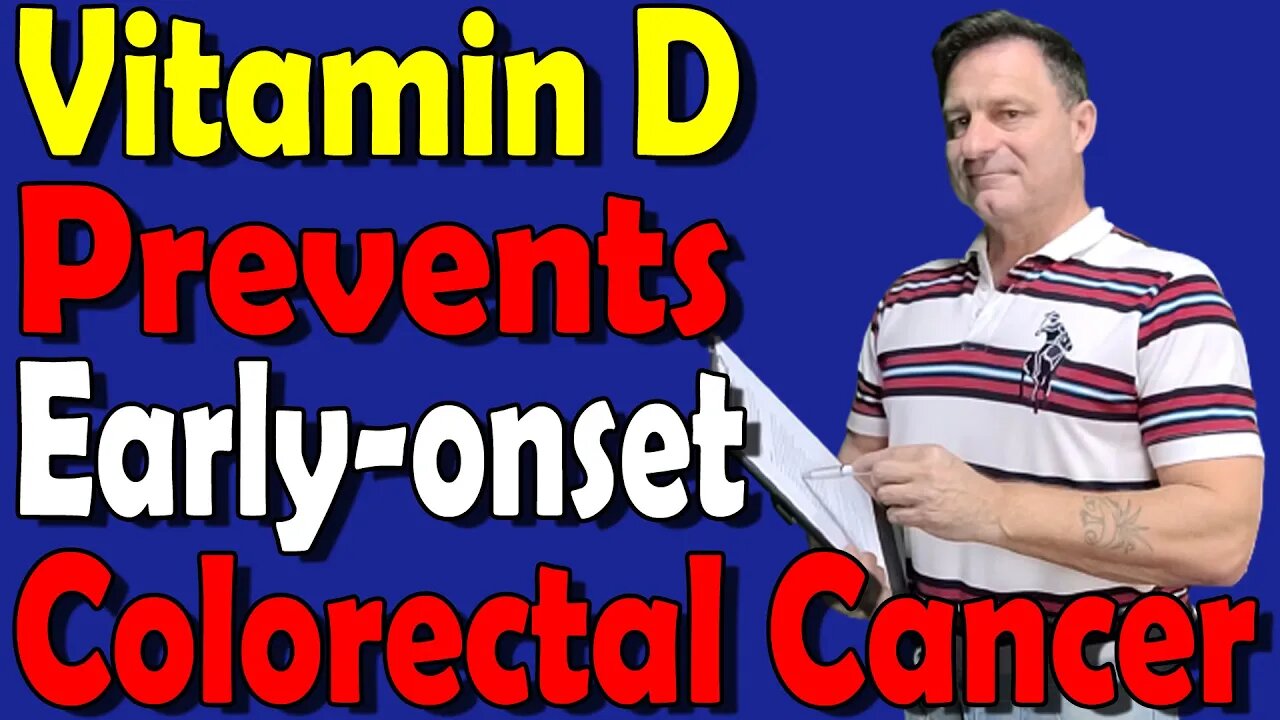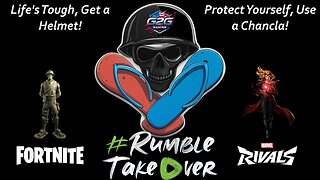Premium Only Content

New Study: Use Vitamin D as a Preventive AGAINST CANCER
As the age at which age-related diseases continues to drop and affect the younger population, this first of its kind study, looks into Vitamin D as a preventative for the young-onset colorectal cancer.
DoNotAge.org 10% Discount Code: MYNMN (https://bit.ly/2VBDgNt)
Renue by Science 10% Discount Code: MYNMN (https://renuebyscience.com/?rfsn=5692699.331801&coupon-code=MYNMN)
Renue by Science 15% Subscription Service Discount Code: MYNMNSUB
I hope you enjoy my content and find it interesting or informative, if so, please consider supporting the channel by using one of the links below:
*Buy me a Kofi: https://ko-fi.com/mynmnexperiment
*Patreon: https://bit.ly/3hhfjl5
*SubscribeStar: https://bit.ly/3psYo23
My Current Anti-Aging Protocol:
• 1.5 grams of NMN (https://bit.ly/3c2Fxt8)
• 1.5 grams of Trans-resveratrol (Tue, Thu & Sat) (https://bit.ly/3yxeqy2)
• 1.5 grams of Berberine (https://bit.ly/3O0v5zq)
• 1.5 grams of TMG (https://bit.ly/3oe1Ted)
• 5,000 IU (International Units) of vitamin D3 (https://bit.ly/3P32hYH)
• 120 mcg (micrograms) of vitamin K2 (Mk 7) (https://bit.ly/3PhkBgn)
• 250mg Magnesium (L-Threonate) (https://bit.ly/3O4pZ5o)
• 200mg high molecular weight hyaluronic acid (https://bit.ly/3P0Z4c2)
• 2,400mg of Fisetin, on the 1st, 2nd & 3rd of each month (https://bit.ly/3P2rSB0)
• 2,400mg of Quercetin, on the 1st, 2nd & 3rd of each month (https://bit.ly/3IzulAy)
• 81mg of aspirin (https://bit.ly/3uFjtem)
https://www.gastrojournal.org/article/S0016-5085(21)03235-2/fulltext
https://www.ncbi.nlm.nih.gov/pmc/articles/PMC3257679/
https://www.ncbi.nlm.nih.gov/pmc/articles/PMC3166406/#:~:text=Vitamin%20D%20can%20modulate%20the,an%20increased%20susceptibility%20to%20infection.
https://www.ncbi.nlm.nih.gov/pmc/articles/PMC3356951/
https://www.ncbi.nlm.nih.gov/pmc/articles/PMC5579593/
https://www.ncbi.nlm.nih.gov/pmc/articles/PMC5952478/
https://www.ncbi.nlm.nih.gov/pmc/articles/PMC4425186/
https://www.ncbi.nlm.nih.gov/pmc/articles/PMC7231123/
https://www.ncbi.nlm.nih.gov/pmc/articles/PMC7305922/
https://www.ncbi.nlm.nih.gov/pmc/articles/PMC6035876/
https://pubmed.ncbi.nlm.nih.gov/17158229/
https://pubmed.ncbi.nlm.nih.gov/3530901/
https://pubmed.ncbi.nlm.nih.gov/22516724/
https://pubmed.ncbi.nlm.nih.gov/14654717/
https://www.ncbi.nlm.nih.gov/pmc/articles/PMC5494092/
https://pubmed.ncbi.nlm.nih.gov/23529983/
https://pubmed.ncbi.nlm.nih.gov/18367736/
https://pubmed.ncbi.nlm.nih.gov/14976978/
https://pubmed.ncbi.nlm.nih.gov/22516724/
https://pubmed.ncbi.nlm.nih.gov/15514282/
https://pubmed.ncbi.nlm.nih.gov/15514282/
https://pubmed.ncbi.nlm.nih.gov/19179058/
The study, recently published online in the journal Gastroenterology, by scientists from Dana-Farber Cancer Institute, the Harvard T.H. Chan School of Public Health, and a number of other institutions, could potentially lead to recommendations for higher vitamin D intake as an inexpensive complement to screening tests as a colorectal cancer prevention strategy for adults younger than 50 years of age. While the overall incidence of colorectal cancer has been declining, cases have been increasing in younger adults; a worrisome trend that has yet to be explained.
The authors of the study, including senior co-authors Dr. Kimmie Ng of Dana-Farber, and Dr. Edward Giovannucci of the T.H. Chan School, noted that vitamin D intake from food sources such as fish, mushrooms, eggs, and milk has decreased in the past several decades.
There is growing evidence of an association between vitamin D and risk of colorectal cancer mortality. However, prior to the current study, no research has examined whether total vitamin D intake is associated with the risk of young-onset colorectal cancer.
Dr. Kimmie Ng, MD, the director of the Young-Onset Colorectal Cancer Center at Dana-Farber said "Vitamin D has known activity against colorectal cancer in laboratory studies. Because vitamin D deficiency has been steadily increasing over the past few years, we wondered whether this could be contributing to the rising rates of colorectal cancer in young individuals. We found that total vitamin D intake of 300 IU per day or more, roughly equivalent to three 8-oz. glasses of milk, was associated with an approximately 50% lower risk of developing young-onset colorectal cancer."
DISCLAIMER: This video and description contain discount codes, which means that if you use the code, I will receive a small commission.
FAIR-USE COPYRIGHT DISCLAIMER
Copyright Disclaimer Under Section 107 of the Copyright Act 1976, allowance is made for "fair use" for purposes such as criticism, commenting, news reporting, teaching, scholarship, and research. Fair use is a use permitted by copyright statute that might otherwise be infringing. Non-profit, educational, or personal use tips the balance in favor of fair use. #VitaminD #VitaminK2 #VitaminD3
-
 8:32
8:32
My Longevity Experiment
21 days agoOff Grid Gym Build in the Philippines | Steel Deck & Cement Pour | Update #8 (Longevity Experiment)
58 -
 58:42
58:42
SGT Report
4 months agoYour REAL NEWS vs. CIA Mockingbird LIES -- Sam Anthony
142K96 -
 2:59
2:59
LimitlessAmbition
18 hours agoPROVE THEM WRONG With This POWERFUL Motivation!
1.34K1 -
 LIVE
LIVE
G2G Gaming Channel
7 hours agoGive me my Helmet, Im going in!! #RumbleGaming
1,514 watching -
 4:45:11
4:45:11
MoFio23!
5 hours agoNintendo Switch It UP Saturdays with The Fellas: LIVE - Episode #3
23.6K3 -
 LIVE
LIVE
SquallRush
3 hours agoMarvel Rivals Collab
348 watching -
 8:36:24
8:36:24
stephengaming94
5 days agofar cry 5 live stream part 3
12.5K1 -
 2:03:28
2:03:28
Barry Cunningham
16 hours agoTRUMP DAILY BRIEFING: 2 DAYS TO GO - ARE YOU READY FOR HISTORY TO BE MADE?
46.1K61 -
 13:41
13:41
Tundra Tactical
7 hours ago $6.83 earnedGOA VP Erich Pratt Tells ATF "COMPLY NOW"
68.5K6 -
 21:06
21:06
BlackDiamondGunsandGear
9 hours agoPSA Dagger Micro Self-Destructs During Shooting! What Happened…
43.3K8